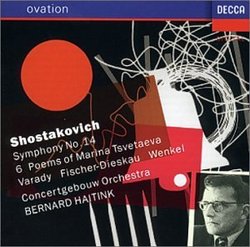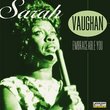| All Artists: Dmitri Shostakovich, Bernard Haitink, Dietrich Fischer-Dieskau, Julia Varady, Concertgebouw Orchestra Amsterdam, Ortrun Wenkel Title: Shostakovich: Symphony No 14, etc / Varady, Fischer-Dieskau, Wenkel; Haitink Members Wishing: 0 Total Copies: 0 Label: Decca Release Date: 8/8/2000 Album Type: Original recording reissued Genres: Pop, Classical Styles: Vocal Pop, Historical Periods, Modern, 20th, & 21st Century, Symphonies Number of Discs: 1 SwapaCD Credits: 1 UPC: 028942507425 |
Search - Dmitri Shostakovich, Bernard Haitink, Dietrich Fischer-Dieskau :: Shostakovich: Symphony No 14, etc / Varady, Fischer-Dieskau, Wenkel; Haitink
 | Dmitri Shostakovich, Bernard Haitink, Dietrich Fischer-Dieskau Shostakovich: Symphony No 14, etc / Varady, Fischer-Dieskau, Wenkel; Haitink Genres: Pop, Classical
|
Larger Image |
CD DetailsSimilarly Requested CDs
|
CD ReviewsSurprisingly, Perhaps, a Dimly-Burning Wick of Hope Karl Henning | Boston, MA | 01/23/2002 (5 out of 5 stars) "This is a clean and exciting performance of the fourteenth symphony; I still remember the chills I felt, hearing it the first time some seventeen years ago. This is the sort of piece which only Edward Gorey would like to listen to on a daily basis, but it is an exquisitely artistic outpouring of grief, rage, despair ... yet not, I think, of absolute resignation.Most of the texts have to do with death, and almost none of the texts regards death in any light other than hopeless, or at the least sardonic. But there is one note something discordant to the otherwise unremitting gloom."O Delvig, Delvig!" always struck me as the heart of the fourteenth symphony, all the more for its warm, passionate cello choir, standing in stark contrast to the "flint-faced" sardonicism ("Malagueña," "Les Attentives I & II," "Réponse des cosaques zaporogues") and the externally-dramatic bleakness ("Lorelei," "À la Santé," and the bookends "De Profundis" and "Der Tod des Dichters") of most of the rest of the symphony. And here at what, musically, I have always felt to be the quiet, self-effacing heart of the piece, we find a text which differs, not sharply perhaps, but significantly, from the unrelieved tone of despair-at-darkness of all the rest of the texts, which (with epochal significance) are more recent ... the sharp-relieved word-paintings of Garcia Lorca, the urbane rationalism and withering wit of Appolinaire. Here, in the company of some of the world's most highly-regarded poets (to add Rilke) we find a highly personal dedicatory poem, written by the unknown-outside-Russia Küchelbecker.Baron Anton Antonovich Delvig (1798-1831) and Wilhelm Karlovich Küchelbecker (1797-1846) were both friends of Pushkin's, from their school days at the Imperial Lyceum at Tsarskoye Selo (where there still stands a magnificent palace with extensive grounds). All three were poets, men of education and refinement. Delvig was packed off to Siberia, and executed as a revolutionary.O Delvig, Delvig! What reward is there for noble deeds and verse? Where and what is the joy in talent amongst villains and fools? In Juvenal's austere hand the dreaded lash whistles at the villains and wipes the color from their cheeks. The power of the tyrants trembled O Delvig, Delvig, what is persecution? Immortality is the reward both of valiant, inspired deeds and of sweet singing! Thus our union will not die, proud, joyful and free! In happiness and grief, firm is the union of lovers of the eternal Muse! The poem fits into Shostakovich's work with conveniently thorough aptness. The two obscurer poets were friends of Pushkin's, himself not only the Great Man of Russian letters, but an artist who found that his works needed to pass a censor. Delvig was a poet who got caught in the wheels of politics, and paid with his life.Yet the message of the poem is not gloom alone; it is not simply a weeping at the injustices of society against Art and the Individual. It is an assurance that noble deeds and sweet singing are rewarded with immortality, and that the artistic bond of the friends will never die, either. The poem is actually a positive response to external grief.For all the unrelenting gloom of the rest of the symphony, for all that Shostakovich is quoted as saying, "Death is it, after death, there is nothing" ... for all this, I don't believe that Shostakovich could have LIVED like that ... and certainly here in the fourteenth symphony, he did not quite write like that. This text, its musical treatment, and its place in the shape of the symphony, all this together is the dimly burning wick which would not be blown out.And too, the one text set in the symphony which has nothing in particular to do with death ("Réponse des cosaques zaporogues") is about rage at, and contempt for, despots, expressed by a fiercely proud, free people. This reminds me that another piece of Shostakovich's which I have long meant to investigate is "The Execution of Stepan Razin," a cossack folk-hero who is a symbol of the spiritual power of free resistance against an oppressor.And the ending of the fourteenth symphony is not the bleak, still resignation of "De Profundis/Der Tod des Dichters" ... but an ironic clip-clop "Conclusion"... and the closing musical gesture is a clipped, tutti, raging in the strings.Certainly a great deal of his experience would teach Shostakovich despair, and it would have taken an extraordinarily strong and determined character to resist learning so. Yet in this work, I see more than just the cynicism. You can be taught to say things, taught even to feel things as though they are practically inside you, and a lot of the life you step through can be about those things ... and yet, down underneath all the accreted layers, you may feel that, really, it isn't, cannot be, true. Like Martin Luther King's "there cannot be great disappointment where there is not great love" ... I wonder if the sharpness, the bitterness, is a refusal to accept. At any rate, I do not see it as an idea he has come to peace with ... at least, not in the fourteenth symphony." Utterly spiritual! Joel Marcus Johnson | Easton, MD United States | 07/26/2005 (5 out of 5 stars) "Mondelli and kph37's reviews are really into the spirit of the work, and I have no complaints with them at all. There are political considerations on two levels. Let me dispose of the first quickly, though I don't mean to do so, because Haitink is truly one of the great conductors of the 20th century. But let's face it that he got caught up in the conductor contest of the Post-Reiner era, when recording companies were elevating Their Man over the others in a marketing joust. Poor Bernard was, in my opinion, a victim in this competition. He was the one who saw the value in letting us hear the inner parts, apart from the raging brass of Solti and colorful antics of Bernstein. Mercy! As for Fidi's shortness of breath or trailing line, well, I think this was the reason for staging him in the work. Imagine, by contrast, bringing in, say, the great Erich Kunz. The bass-baritone portions of this work are those of resignation, not of confidence. For the sake of the poetry, Fidi was perfect. He is not supposed to be the bombast vocalist. His is the voice of sad resignation. Now, the other political level, that of the composer. Shostakovich lived under Stalin's thumb, to an extent that no composer today can imagine. Some understanding of history is in order. Dmitri was in a life and death struggle with the homicidal maniac controlling the former Soviet Union. Some understanding of art requires an understanding of history. And, therefore, of empathy with Dmitri. All told, this is a sublime recording. In future generations, the work will be reviewed only from the technical point of view. It takes musicians who lived through that ghastly horror of the German invasion of Russia, of one racist terrorist regime invading another. This is a very perturbing work. Who could have done it better than those who lived through it? Then, Ortrum Wenkel's performance of the Tsvetaeva songs should be given more attention. Yes, they are pretty literal readings. But aren't the works written the same dead pan way? These are hardly folksongs in the sense of Mahler or Britten, but introspective pieces. I really like her work here. Buy this CD it while it lasts." A Richly Nuanced Performance of Shostakovich's Symphony of D Grady Harp | Los Angeles, CA United States | 02/03/2006 (5 out of 5 stars) "Despite the fact that there are multiple recordings of Shostakovich's deeply moving Symphony No. 14, this rather old but remastered recording is unique in the quality of performance: Bernard Haitink conducts his Concertgebouw Orchestra and elected to use non-Slavic singers Julia Varady and Dietrich Fischer-Dieskau who in turn sing the poems in their original languages rather than the Russian translations used in the original premiere. The effect is staggeringly beautiful and if one must choose a single recording of this symphony, this would be the one that captures the essence of Shostakovich's vision.
Written in 1969 while ill, Shostakovich was naturally achingly concerned about his impending death and in response to his admiration for Moussorgsky's 'Songs and Dances of Death' he wished to make his musical statement about the end of life. 'They wanted the finale to be comforting, to say that death is only the beginning. But it's not a beginning, it's the real end, there will be nothing afterwards, nothing.' And with this grim concept he selected eleven poems by a varied group of poets who mostly died young: Garcia Lorca, Guillaume Appollinaire, Wilhelm Kuchelberger, and Rainer Maria Rilke. The poems are sung by soprano and baritone solo and in duet, and the beauty of Varady and Fischer-Dieskau intoning the words in Spanish, French, Russian, and German somehow gives the poetry more immediacy. The orchestration is for twenty-one performers: two percussionist, celesta, and eighteen strings. The writing is transparent and delicate with some of the most gorgeous sectional ensemble playing (particularly for cellos and double bass) Shostakovich ever wrote. Haitink serves the score well. As an additional bonus on this CD, Haitink conducts the `Six Poems of Marina Tsvetaeva' beautifully sung by Ortrun Wenkel. For this reviewer the experience of hearing this chamber work that speaks so profoundly about death in the wonder of the acoustic of Disney Hall in Los Angeles makes this symphony emphatically one of Shostakovich's finest works. Esa-Pekka Salonen with the LA Philharmonic approached the work with such humanity and utter clarity of performance, using as soloists Matthias Goerne and brilliant young Russian dramatic soprano Tatiana Pavlovskaya to breathe meaning and incredible atmosphere that the effect was one of those once in a lifetime experiences. If only THAT performance could be added to the recorded repertoire.... Highly recommended. Grady Harp, February 06" |

 Track Listings (17) - Disc #1
Track Listings (17) - Disc #1








